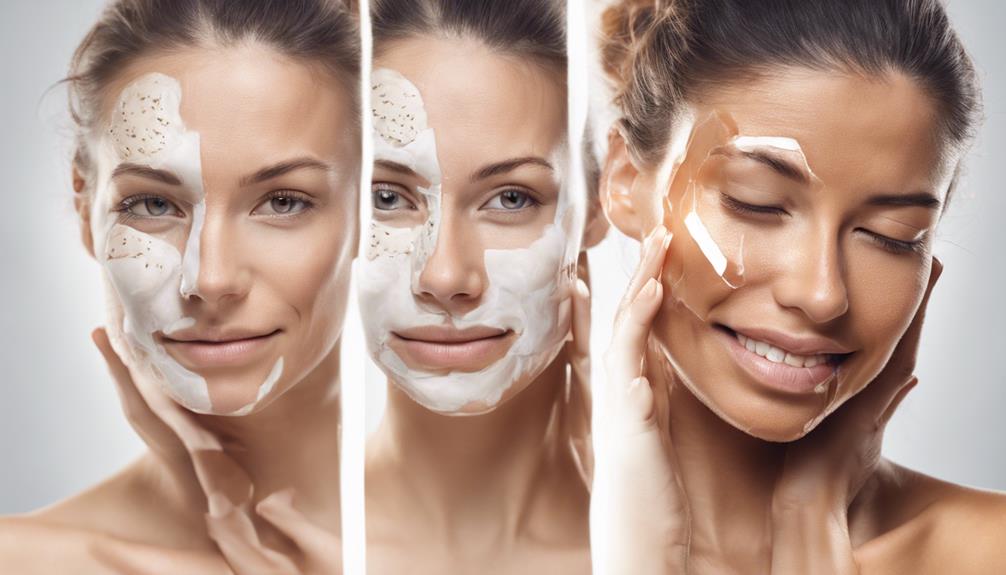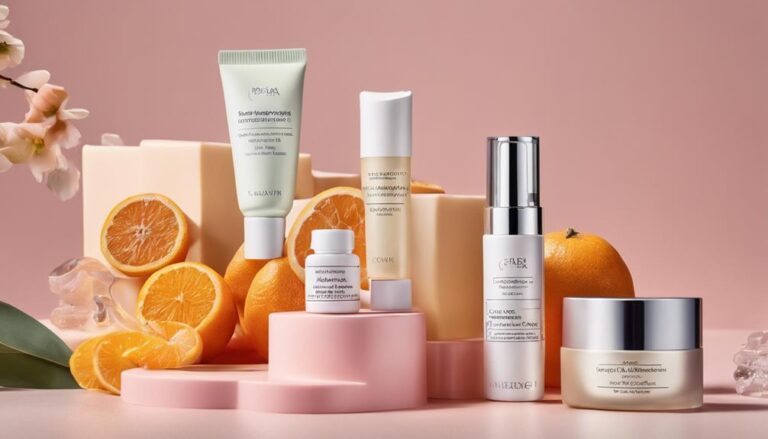Stress Management for Glowing Skin
You might be surprised to discover just how much stress impacts the health of your skin. The connection between your mental well-being and skin condition is undeniable, with stress wreaking havoc on your complexion. But fear not, there are effective strategies you can implement to manage stress for glowing skin that go beyond skincare products. By exploring the correlation between stress levels and skin health, you can unlock the key to a radiant, blemish-free complexion.
Key Takeaways
- Engage in stress-relief activities like meditation and deep breathing.
- Prioritize a balanced diet with skin-nourishing superfoods.
- Incorporate regular exercise for endorphin release and skin benefits.
- Ensure quality sleep to regulate cortisol levels and promote skin repair.
- Practice mindfulness to reduce stress and enhance skin health.
The Link Between Stress and Skin
Stress and its impact on the skin are closely intertwined, with research consistently showing the detrimental effects of stress on skin health. Your skin's resilience can be compromised when you're under prolonged stress. Emotional triggers like anxiety, worry, or even lack of sleep can manifest on your skin in various ways. Acne breakouts, eczema flare-ups, and even accelerated aging are common outcomes. Understanding how emotional triggers affect your skin is crucial in maintaining its health and appearance.
When stress levels rise, your body releases hormones like cortisol, which can disrupt the skin's natural balance. This disruption weakens the skin's protective barrier, making it more susceptible to damage from external factors like pollution and UV radiation. Additionally, stress can lead to inflammation, further exacerbating skin conditions.
Understanding Stress Hormones
The body's response to stress involves a complex interplay of hormones that can significantly impact various bodily systems, including the skin. When stress hormones are released in response to a perceived threat or challenge, they can disrupt the delicate balance of hormones in the body, leading to issues with hormonal balance. This imbalance can manifest in various ways, one of which is through skin inflammation.
Hormonal balance is crucial for maintaining healthy skin. When stress hormones like cortisol are elevated for prolonged periods, they can trigger an inflammatory response in the skin. This inflammation can exacerbate conditions such as acne, eczema, psoriasis, and rosacea.
Additionally, imbalances in hormones can affect oil production, collagen synthesis, and skin barrier function, all of which are essential for healthy, glowing skin.
Understanding the impact of stress hormones on the skin is key to managing stress-related skin issues. By focusing on techniques to reduce stress levels and promote hormonal balance, you can help mitigate skin inflammation and promote a clearer, more radiant complexion.
Impact of Stress on Skin
Research indicates that stress can have a profound impact on the health and appearance of your skin. The correlation between stress and skin condition is well-documented. When you are under stress, your body releases hormones like cortisol, which can lead to increased oil production, inflammation, and a compromised skin barrier. These effects can manifest in various ways, affecting your skin's appearance and overall health. Here is a table outlining some of the common skin conditions influenced by stress:
| Skin Condition | Stress Correlation | Skin Appearance |
|---|---|---|
| Acne | Stress can exacerbate acne | Increased breakouts |
| Eczema | Stress can trigger flare-ups | Redness and itching |
| Psoriasis | Stress can worsen symptoms | Flaky, irritated patches |
Understanding how stress impacts your skin is crucial in developing an effective skincare routine that addresses both the external and internal factors contributing to skin issues. Taking steps to manage stress can significantly improve your skin's health and appearance.
Signs of Stress on Skin
Experiencing heightened levels of stress can manifest in various ways on your skin, serving as a visible indicator of your internal state. When stress takes its toll, your skin may react in different ways, indicating the need for self-care and stress management. Here are some common skin reactions and stress indicators to watch out for:
- Acne Breakouts: Stress can trigger the release of hormones that increase oil production, leading to more breakouts.
- Dryness and Dehydration: High-stress levels can disrupt your skin's barrier function, causing dryness and lack of hydration.
- Redness and Inflammation: Stress can exacerbate skin conditions like eczema, rosacea, and psoriasis, leading to increased redness and inflammation.
- Dullness and Uneven Tone: Lack of proper stress management can result in poor circulation, giving your skin a lackluster appearance and uneven tone.
Importance of Stress Management
When managing stress, it is crucial to understand the significant impact it can have on your skin's health and overall well-being. Stress can trigger various skin issues like acne, eczema, and premature aging. To combat these effects, incorporating stress management techniques into your routine is essential. Two effective methods are meditation and breathing exercises.
Importance of Stress Management
Stress Management Techniques:
| Technique | Benefits | How to Practice |
|---|---|---|
| Meditation | Reduces cortisol levels, calms the mind | Find a quiet space, focus on breathing and present moment |
| Breathing exercises | Promotes relaxation, lowers blood pressure | Inhale deeply, hold, exhale slowly, repeat |
Mind-Body Connection
The connection between the mind and body is a fundamental aspect of overall health and well-being. Cultivating this relationship can greatly impact the health of your skin. Here are some ways to harness the power of the mind-body connection for radiant skin:
- Meditation Benefits: Engaging in meditation practices can help reduce stress levels, leading to a calmer mind and improved skin health.
- Breathing Exercises: Deep breathing exercises can enhance oxygen flow to your skin cells, promoting a healthy glow and aiding in detoxification.
- Mindfulness Practices: Being present in the moment through mindfulness techniques can reduce anxiety levels, preventing skin issues exacerbated by stress.
- Yoga: Incorporating yoga into your routine can't only increase flexibility and strength but also promote relaxation and balance, which can positively impact your skin's appearance.
Relaxation Techniques for Skin
To enhance the health and appearance of your skin, incorporating relaxation techniques into your routine can be beneficial. Engaging in breathing exercises not only calms your mind but also promotes oxygen flow, which is essential for skin health. Deep breathing techniques can help reduce stress levels, leading to a more radiant complexion.
Aromatherapy benefits are another great way to relax and improve your skin's condition. Certain essential oils like lavender, rose, and chamomile have soothing properties that can help alleviate stress and inflammation, leading to healthier skin.
Incorporating these oils into your skincare routine or diffusing them in your living space can create a calming environment that benefits both your mind and skin.
Healthy Lifestyle Habits
Pampering your skin with relaxation techniques is a great start, but to truly achieve that radiant glow, incorporating healthy lifestyle habits is key. Cultivating a routine that prioritizes wellness can work wonders for your skin and overall well-being. Here are some habits to consider:
- Mindfulness Practice: Engage in activities like meditation or yoga to center your mind and reduce stress, which can positively impact your skin health.
- Self Care Rituals: Dedicate time daily to practices that nourish your body and soul, such as skincare routines, exercise, or enjoying a warm bath.
- Balanced Diet: Fuel your body with nutrient-rich foods like fruits, vegetables, whole grains, and lean proteins to support healthy skin from the inside out.
- Adequate Sleep: Ensure you get enough restful sleep each night as it allows your skin to repair and rejuvenate, leading to a glowing complexion.
Incorporating these habits into your daily life can help you achieve that coveted radiant skin you desire while promoting overall wellness.
Skincare Routine for Stress Relief
Indulging in a consistent skincare routine tailored for stress relief can be a game-changer in achieving a healthy, glowing complexion. Taking care of your skin is not just about external factors but also about nurturing your inner peace and well-being. Incorporating meditation techniques and aromatherapy benefits into your skincare routine can help you relax, unwind, and rejuvenate both your mind and skin.
Skincare Routine for Stress Relief
| Meditation Techniques | Aromatherapy Benefits |
|---|---|
| Deep breathing exercises | Lavender oil for calming effects |
| Mindfulness meditation | Peppermint oil for energy boost |
| Visualization techniques | Chamomile oil for relaxation |
| Body scan meditation | Rose oil for stress relief |
| Loving-kindness meditation | Eucalyptus oil for mental clarity |
Diet and Nutrition Tips
Incorporating a balanced and nourishing diet plays a crucial role in maintaining healthy skin and managing stress levels effectively. When it comes to your diet and nutrition for glowing skin and stress management, consider the following tips:
- Superfoods for Skin: Integrate superfoods like berries, fatty fish, avocados, and nuts into your meals. These foods are rich in antioxidants, omega-3 fatty acids, and vitamins that promote skin health and combat stress.
- Hydration Tips: Ensure you stay hydrated throughout the day by drinking an adequate amount of water. Hydration is key for maintaining skin elasticity and reducing stress levels.
- Whole Grains: Opt for whole grains like quinoa and brown rice. They're high in nutrients and can help stabilize blood sugar levels, which in turn can impact stress levels positively.
- Leafy Greens: Incorporate leafy greens such as spinach and kale into your diet. These greens are packed with vitamins and minerals that support skin health and overall well-being.
Exercise for Stress Reduction
Regular physical activity is a powerful tool in managing stress and promoting overall well-being. Exercise not only strengthens your body but also nurtures the mind-body connection crucial for stress reduction. Engaging in activities like yoga, running, or dancing can help release endorphins, the body's natural stress relievers, while also improving circulation, which in turn benefits your skin by delivering essential nutrients and oxygen.
The mind-body connection established through exercise can enhance your awareness of stress triggers and provide a healthy outlet for managing them effectively.
Studies have shown that regular exercise can reduce the production of cortisol, the stress hormone that can wreak havoc on your skin by causing inflammation and breakouts. By incorporating physical activity into your routine, you aren't only taking care of your body but also nurturing your skin from within.
Sleep Hygiene for Skin Health
How does your sleep routine impact the health of your skin? Quality sleep is crucial for maintaining healthy skin. Poor sleep hygiene can lead to an array of skin issues, from premature aging to breakouts. Here are some key points on how sleep quality affects your skin health:
- Regulates Stress Levels: Adequate sleep helps regulate cortisol levels, reducing stress that can trigger skin problems.
- Enhances Skin Repair: During deep sleep, cell turnover and collagen production increase, promoting skin repair and rejuvenation.
- Improves Skin Elasticity: Quality sleep allows the skin to retain more moisture, enhancing elasticity and reducing the appearance of wrinkles.
- Reduces Inflammation: Lack of sleep can lead to increased inflammation in the body, exacerbating skin conditions like acne and eczema.
Prioritizing good sleep hygiene is a simple yet powerful way to support your skin's health and overall well-being. Make quality sleep a non-negotiable part of your skincare routine for a radiant complexion.
Frequently Asked Questions
Can Stress Cause Specific Skin Conditions Like Eczema or Psoriasis?
Yes, stress can trigger flare-ups of skin conditions like eczema or psoriasis. Emotional stress can impact your skin's health, leading to inflammation and worsening symptoms. Managing stress through relaxation techniques and self-care can help alleviate skin issues.
How Does Stress Affect the Skin's Aging Process?
When stress hits, your skin feels it too! Collagen production slows down, leading to decreased skin elasticity. The aging process speeds up, causing fine lines and wrinkles to appear sooner. Relaxation techniques can help combat these effects.
Is There a Link Between Stress and Acne Breakouts?
When stress triggers hormonal imbalance, it can lead to an inflammation response in your skin, potentially causing acne breakouts. Managing stress through relaxation techniques and self-care can help balance hormones and improve skin health.
Can Stress Impact the Skin Differently Based on Age or Gender?
Hey there, did you know that stress can impact the skin differently based on age or gender? Hormonal changes and genetic predispositions can play a role. It's fascinating how our bodies respond uniquely to stressors.
Does Stress Management Improve Overall Skin Health or Just Appearance?
Improving stress management enhances mental health and overall skin health, not just appearance. By reducing stress, you can positively impact your skin's condition beyond skincare routines. Prioritize mental well-being for a radiant complexion inside and out.
Conclusion
In conclusion, managing stress is crucial for achieving glowing skin. Just like a garden needs nurturing to bloom, your skin requires care and attention to radiate beauty. By incorporating stress-relief techniques into your daily routine, you can promote overall skin health, prevent common issues, and maintain a healthy complexion. Remember, taking care of your mental well-being is just as important as taking care of your skin.















